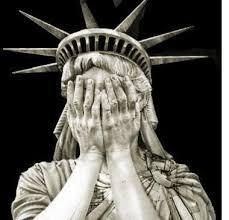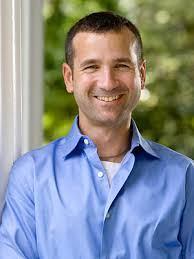 Javier Corrales is the Dwight Morrow professor of political science at Amherst. I recently heard him give a talk about the situation in Venezuela, divided into three parts: what he called “democratic backsliding;” economic collapse; and lessons for America.
Javier Corrales is the Dwight Morrow professor of political science at Amherst. I recently heard him give a talk about the situation in Venezuela, divided into three parts: what he called “democratic backsliding;” economic collapse; and lessons for America.
Corrales explained that the democratic decline preceded and led to Venezuela’s economic disaster. And he saw reasons for concern that the story could repeat even in well-established democracies like ours.
Corrales started with “Democracy 101.” America, in the 1700s, basically invented the modern concept of liberal democracy.
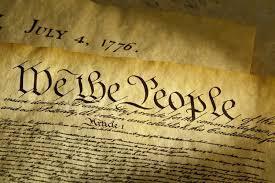
For a time, after WWII, and especially after the Cold War, liberal democracy was spreading. But then came a “democratic recession” beginning around 2006. Notable cases are Turkey and Hungary, and of course Venezuela. What we see is not the “old fashioned” putsch, but something that more insidiously starts in ambiguity — what Corrales called “executive aggrandizement,” with other centers of power being neutered or co-opted. The picture may ostensibly seem at first more democratic, with a majority thinking they’re getting what they voted for.
Then the regime uses and abuses laws, and creates new ones, to make an uneven political playing field. Elections are still held, but they’re manipulated by a host of measures to produce the desired results. The ruling party becomes a rubber stamp cheering section. The opposition is demonized and delegitimized. Press freedom and public debate are suppressed.
Political scientists use a host of criteria to measure a nation’s degree of democracy. Corrales presented a graphic timeline of Venezuela’s scores. They started low, with a dictatorship until the 1950s, when they jumped to a sustained democratic plateau. Then in 1999 Hugo Chavez (a former would-be putschist) got elected president, and Venezuela’s democratic score fell off a cliff. (Corrales also displayed Cuba’s graph — basically flatlined since the 1959 Castro takeover — and America’s, starting high and rising higher through the period, but with a noticeable drop in the last few years.)
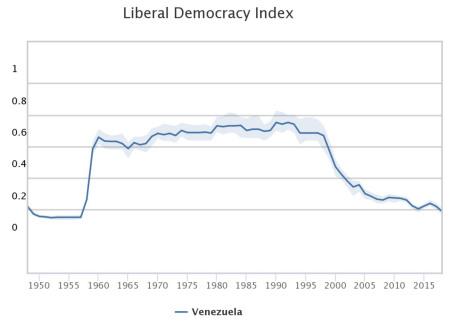
Another set of criteria encompasses all the specific ways in which undemocratic regimes subvert fair elections, and here again a detailed chart was presented for Venezuela. At the start of the Chavez era, voting was still pretty much fair. But then the regime utilized ever more of the measures on the chart, to the point where today, Venezuela’s voting is a cynical charade.
The manipulation became necessary because whereas Chavez was actually popular for a while, the regime’s popularity faded, and nosedived under his successor Maduro. This leads us to the matter of the economic disaster. Venezuela is an oil state; that is, almost all its national earnings are from oil.

In Venezuela’s case, the regime’s economic mismanagement became tragically evident, plunging the once-rich nation into poverty, with an inflation rate measured in millions of percent, and a tenth of the 30 million population escaping to other countries. Corrales explained that Chavez not only imprudently spent all the oil windfall (saving nothing), but went deep into debt besides. While some of this profligacy did trickle down to the poor, most was frittered away through corruption and incompetence. None was allocated to investment to build the economy.
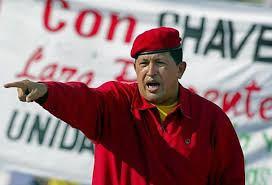
Corrales rejected any idea that America somehow bears responsibility for Venezuela’s travail. To the contrary, he said, the U.S. actually helped finance the regime by buying its oil (now stopped). Meantime its oil income has plunged due to its mismanagement, stuffing the state oil company with political hacks.
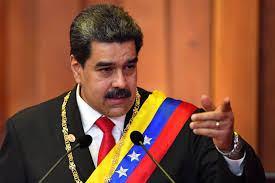
The lessons here for America should be obvious by now. I have written about the burgeoning phenomenon of political populism (https://rationaloptimist.wordpress.com/2017/12/28/what-is-populism/.) Corrales said the world’s democratic backsliding is driven by populism, defined by its perceived political betes-noires. On the left (epitomized by Venezuela) it’s anti-capitalism, anti-imperialism, anti-Americanism. Bernie-style populism inveighs against “neoliberalism,” corporations, and the rich. Right-wing populism typically demonizes the intelligentsia, elites, immigrants, ethnic minorities, and crime. For both right and left, the stomping on hated enemies can excuse the stomping on democratic norms. (Many Western lefties still defend Maduro.)
